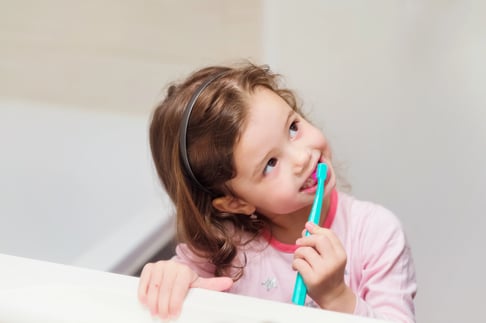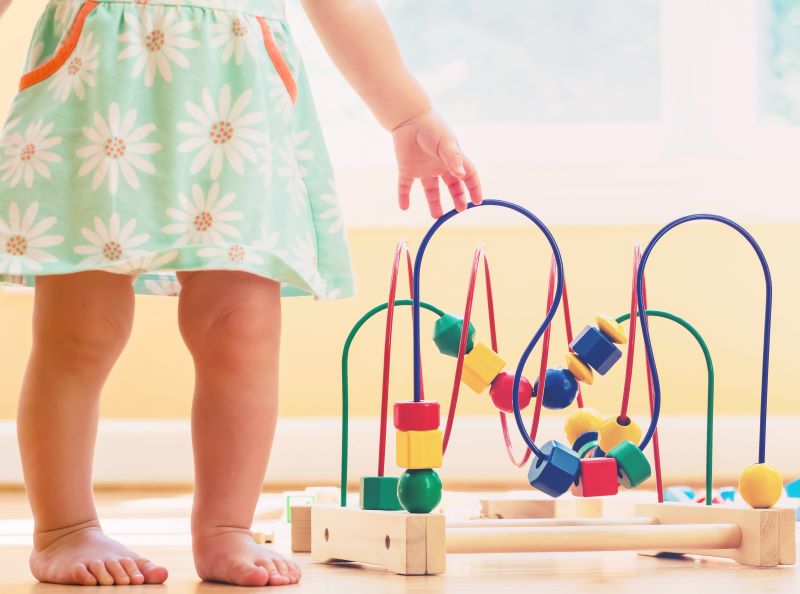What is a routine?
 Simply put, a routine is a set of behaviors and actions that happen on a regular basis, often at the same time each day or week, depending on the frequency of the activity. Most people brush their teeth twice a day (we hope,) and this is a habit that has been ingrained within us since childhood. We simply cannot imagine our life without brushing our teeth multiple times per day.
Simply put, a routine is a set of behaviors and actions that happen on a regular basis, often at the same time each day or week, depending on the frequency of the activity. Most people brush their teeth twice a day (we hope,) and this is a habit that has been ingrained within us since childhood. We simply cannot imagine our life without brushing our teeth multiple times per day.
But when it comes to morning and evening routines, some people may not follow a strict schedule for both themselves and their children. Maybe the first thing you do after work is hit the couch, watch some tv, and veg out for the remainder of the night because you’re too mentally and physically tired to do anything else. Maybe you would love to do some yoga, rearrange your linen closet, or cook an elaborate meal. But you lack the routine and schedule that would help you accomplish these things, (even on days you really don’t feel like sticking to it.)
Days turn into weeks and months, and before you know it, you haven’t exercised in ages and household chores have overcome you. And in my personal experience, creating a routine for myself has put me back on track and kept me there. The simplicity of writing down what you wish to accomplish in a day may be enough to hold yourself accountable. Maybe you have a planning journal, use Google Calendar, or utilize another app or device to maintain your schedule. Now is the time to get your kids started on their own routine, and here’s why.
A daily routine provides structure in our lives, helps us manage our time better, and allows us to “schedule in” activities that are important to us and our families. Some activities may include exercising, working on a passion project, and carving out a piece of each day to indulge in some hobbies and extracurricular activities. Daily routines provide us a framework to live by each day to help us check off all the boxes on our to-do list and still make space for leisure time and fun. Without a routine, we are more likely to procrastinate and feel mentally scattered or exhausted. Our projects may never get started or finished, and your dreams of putting our kids on a path to success may be clouded by having what many of us call “no time” to do something.
Most people agree that adults do find comfort in a routine, even at the minimum. Though, some may question whether children actually benefit from having a routine or not. Critics claim that we should just, “Let kids be kids.”
Students will feel overwhelmed at times as they develop their time management skills and navigate getting through tough homework assignments. There will be times when they rush through their work so they can go play with friends, or end up playing video games for far longer periods of time than they should.
Implementing routines and helpful habits early will not only reduce their worries about getting work done. It will prepare them for an adulthood of efficiency and ease. So, what kind of routines will stick and really help my child?
Well, many children already have a designated bath time and bedtime, and possibly a dinner time and homework time. That’s a good start, but we can add more to their routine to get the absolute most out of each day possible. Creating routines foster repetition and learning.
Mornings
- Practice Mentals each night before bedtime or every morning at breakfast. Figure out what works best for your child. Experiment with different activities at varied times of day to figure out what your child prefers. Then, stick with it.
- In the morning, have your child make their bed soon after waking.
- Perhaps your child wakes up early to do exercise, spend time outside, or even prepare breakfast for themselves, depending on their age.
- Have your child get dressed each morning, (even if you are quarantining.) Staying in pajamas all day may seem like a harmless thing to do as a child, but this could foster feelings of laziness. This is because we associate pajamas and loungewear with rest and sleep. If we wear those clothes all day each day, we may begin to always act lazy and unmotivated.
Evenings
- Involve them with after school activities like sports, music, etc. Experiment with a variety of activities to figure out what your child loves the most.
- Have homework time that is the same each night.
- If possible, have dinner at the same time.
- Schedule in screen time/television/video games for a specific amount of time. Your child should know that at the end of this duration, there will be no more screen time and there are absolutely no exceptions.
- Bath time or shower time should happen after the same activity each night, whether it be before dinner or right before bedtime. It does not matter what time bathing time is, but your child should have an expectation about when it’s going to happen each day.
- In the evening, have your child get into bed at the same time each night.
- Depending on their age, read a story or two to them or have them read for a specific amount of time.
Transitions
Routines not only help children become more organized and gain responsibility. They help children cope with transitions. This can be small-scale, like moving from one activity to the next like play time to lunchtime. Or, it can be bigger like starting a new grade or extracurricular activity.
Some ways you can transition your children from one activity to the next is with a 5 minute timer, a book, a song, or a specific activity. For example, if you are dropping your child off for their Genie Academy class, you can count all the stoplights you pass on the way there together.
Anxiety Reduction
If you choose to implement routine activities from an early age, this will likely reduce a lot of anxiety within your child and help them know that they can always accomplish what they set their mind to.
Also, when taking on new responsibilities and tasks, a routine will ensure to your child that they will still have time for play time, leisure time, etc, and get to try new things that interest them. Routines will help your child to feel safe.
Transition into a Routine
If you’re having difficulties getting your child to take to a new routine, try framing their schedule around daily events that already happen- like meal time and bedtime. You can try saying, “Let’s study for your test before dinner.” Then, you can start asking your child to study each night before dinner. They can study while you cook and ask you questions. Before you know it, they will get into the habit of studying before dinner. Since you framed this new addition to your routine onto something that was already there, this will make it easier for your child to adjust without even realizing it.
If starting a routine from scratch, don’t schedule your child’s entire day for them, planned minute by minute. Add in one thing at a time and let them adjust for a few days or weeks, depending on the activity. A slow and steady adjustment will guarantee that they will stick to it and enjoy it. If you throw everything at your child at once, they may rebel and feel controlled. This may even cause them to become resentful and/or helpless in deciding what they want to do. Find a healthy balance by easing your child into a new schedule that will benefit them.
Boundaries
Routines will also give your child clear expectations and boundaries that they will learn how to implement into their own life with others. Perhaps a part of their routine establishes that dessert is served only after dinner is completed. Or, there are no devices allowed at the dinner table and if this rule is broken, there will be no screen time that night. This teaches children that there are consequences for their actions. They also begin to understand that it is their choice as to whether or not they wish to adhere to the boundaries set in place or not.
Kids who attend Genie Academy not only get a taste of what having a routine really means. They get to see first hand all that can be accomplished through hard work, studying, and taking time to improve themselves.
We are always incredibly proud of our Genie Academy students, and find it incredibly rewarding to see them progress and gain confidence in themselves. Whether it be learning a new skill, enjoying the challenge of something they haven't yet encountered in their regular school, or finally grasping a particular topic that they have been struggling with, we are here to support our students through routine and repetition.
Join our Genie Academy team today by signing up for a free class and assessment here.
If you enjoyed this blog post, you may also like this one.
The Genie Academy Team





